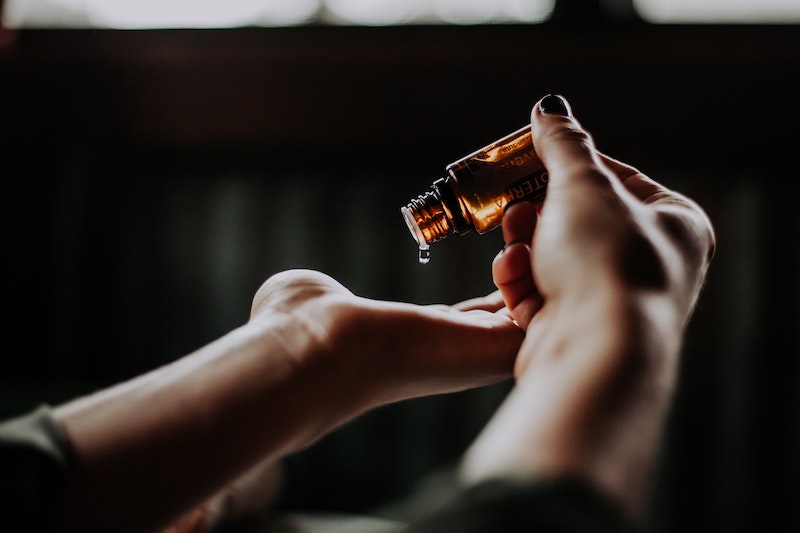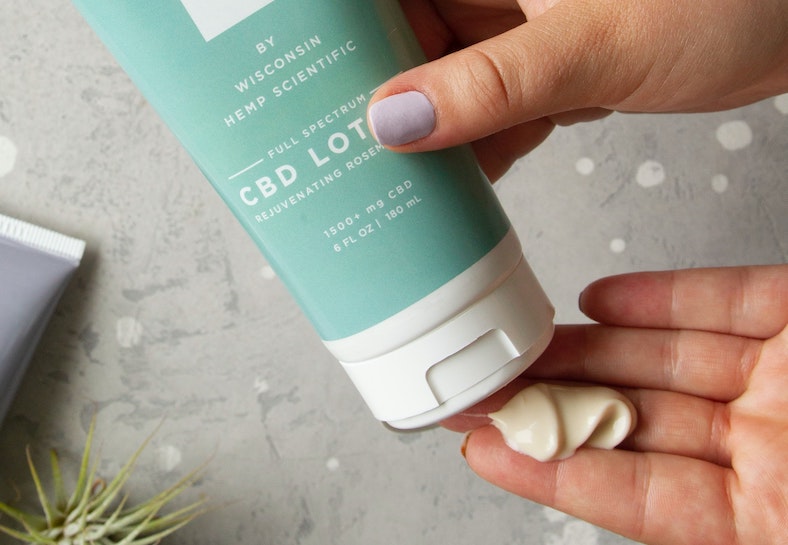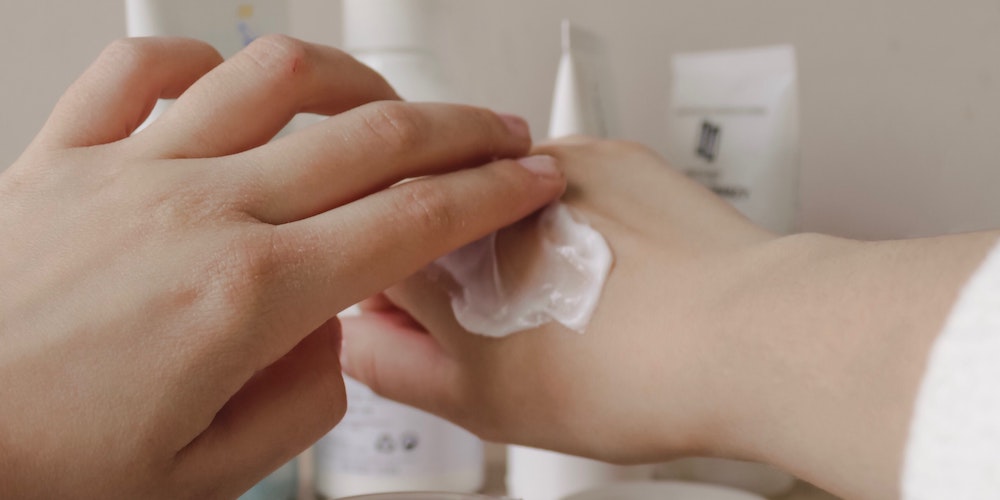Cannabidiol (CBD) is still most commonly taken in oil, but topical CBD products are increasingly popular for several reasons. CBD topicals offer localized relief, and they also benefit the overall appearance and health of the skin. In this sense, topical CBD products are giving you multiple benefits and products in one.
CBD topical and CBD oil formulations are also different. Topical formulations typically contain various skincare ingredients, such as herbal extracts, essential oils, and vitamins. Naturally, you want to avoid ingredients that are irritating.
CBD topicals include creams, lotions, salves, balms, serums, massage oils, and more. They are sometimes designed for a particular use, such as face products, lip balms, and pain-relieving products.
In This Post:
- CBD and Skin
- CBD Skin Care Benefits
- What is CBD Cream
- How to Use CBD Topicals
- Picking a CBD Topical
CBD and Skin
Cannabidiol or CBD is one of many non-psychoactive cannabinoids, phytochemicals present in cannabis. Tetrahydrocannabinol (THC) is the other main cannabinoid—and the one responsible for the famous cannabis “high.”
Both marijuana and hemp plants are part of the cannabis family. However, according to United States federal law, hemp contains 0.3 percent THC or less, in contrast to marijuana. This and other reasons mean that hemp is typically used for CBD cultivation and extraction.

Growers can use CBD extracted from hemp plants to make a variety of CBD products, including pure CBD oil tinctures, edibles like CBD gummies—and of course, CBD topicals. CBD products, topical or otherwise, do not produce the “high” that medical marijuana products that include THC cause.
The endocannabinoid system (ECS) governs many functions in the human body, including the ability to process pain, sleep, inflammation, mood, and more. The cannabis plant—both marijuana and hemp—contains phytocannabinoids that interact with the ECS, including CBD oil found to reduce inflammation and intensity of pain.
Research proves that CBD has various therapeutic properties, but what about the skin? And doesn’t putting CBD in something oily make it worse?
The right oil or other source of healthy fat is actually good for your face because it’s a source of good moisture and won’t clog your pores. Skin demands oil up to a point to function. In fact, scrubbing too much away will only make it produce more. Replacing oils with healthy moisturizing compounds can help this issue.
CBD and other cannabinoids are beneficial antioxidants for skin. Healthy skin also need B-complex vitamins and essential amino acids, many of which are found in CBD.
The skin also has its own endocannabinoid system, which works to keep the skin balanced and healthy. The goal is stasis, just like it is for the endocannabinoid system throughout the human body: EC system keeps everything on an even keel, including the skin.
In fact, CBD is useful to healthy skin because some kind of an imbalance is usually the root cause of most skin problems. There is still extensive research outstanding, but here is what we know about CBD and skin right now:
Acne. Acne is mostly caused by hormones, but CBD helps fight the inflammation related to acne’s redness and swelling, and helps normalize skin.
Inflammation. Transdermal CBD reduces pain and inflammation in rats, making it treatment for skin issues such as rosacea, eczema, and psoriasis.
Itching. CBD can block itching in the nerve endings and has been shown to help chronic, treatment-resistant itching.
Scarring. CBD may improve scarring according to one study of scar tissue patients.
CBD Skin Care Benefits
CBD has lots of potential skin care benefits:
Reduce signs of aging. Antioxidants like vitamin E or vitamin C treat dryness, free radical damage, and inflammation, so you can expect CBD products to do that, too. That includes signs of aging such as fine lines, dark spots, and wrinkles.
Balance complexion. CBD helps the ECS in the skin stay in balance, meaning enough hydration and no excess oil, so no more oily T-zone or patchy spots.
Soothe skin. Topical CBD products can soothe itching, dryness, and red skin thanks to this cannabinoid’s anti-inflammatory qualities.
What is CBD Cream?
Since the Farm Bill legalized CBD products derived from hemp at the federal level in 2018, CBD topicals have been the work of the Food and Drug Administration FDA. This doesn’t mean there’s a clearly regulated market out there, however.
CBD-infused topicals include creams, balms, salves, lotions, and transdermal patches. They are designed to be applied directly to the skin for surface level relief, or in some cases for deeper muscle level pain relief, or even for things like relaxation or sleep.
Anything called CBD cream is just a cream-based topical infused with CBD. Most high-quality health and beauty creams are about half oil and half water to preserve moisture in the skin. Some CBD topicals might also include other minor cannabinoids, other terpenes, or even other ingredients to help the skin such as vitamin E or aloe.
Much of the difference among CBD topicals such as salves, creams, balms, and lotions lies in consistency, fragrance, other ingredients—and user preference. Since creams are thicker, and especially those with high fat content and emollient qualities might help dry skin sufferers and those with itchy skin conditions. Balms and salves are made with wax and oil, making them absorb more slowly and work well for massing into muscles, for chronic pain. Roll-on tinctures offer yet another possibility for THC-free joint pain relief. Learn more in our roundup of the best CBD creams for pain relief.
How to Use CBD Cream
One of the most appealing things about CBD topicals is how easy it is to get started with them. After identifying what the source of discomfort, pain, or the other issue is, the user can simply apply the topical as needed like they would a lotion.
It’s true that using topical CBD creams is not the same as using lotion, in that it’s important to know how many milligrams are in the CBD body lotion to use it properly. A low dose topical may be less effective than one with higher concentrations of CBD.
However, as always, it’s smart to start with a low viable dosage. From there, gradually increase how much CBD cream you use until your therapeutic dose seems optimal. There are no known side effects to worry about with topical infused with hemp-derived CBD, although you should always check with a doctor when trying anything new.
Picking a CBD Cream
There are several important criteria when it comes to choosing high-quality CBD products, including topicals:

Quality controlLook for CBD topical vendors that display results from third-party lab testing. Look for Good Manufacturing Practice (CGMP)-compliant facilities, which follow FDA standards to qualify. This matters: a 2017 study found that only 31 percent of CBD hemp oil products were accurately labeled with the correct CBD level.
Hemp source. Buy topical CBD products made with non-GMO, USA-grown hemp when possible.
Extraction method. Robust, reliable extraction methods such as CO2 and ethanol produce high-quality products.
Brand reputation. This isn’t always easy to suss out, and it’s not just about size or longevity. Check real reviews and consumer ratings where they exist.
Strength/potency. Although there is no one recommended strength or dose of CBD, topical products made from hemp vary greatly in how many mg of CBD per ounce they contain, so pay close attention to this.
Type of hemp extract. Full-spectrum extract is from the whole hemp plant and contains some trace amount of THC. Broad-spectrum extract contains the full spectrum of cannabinoids except no THC. CBD isolate is pure CBD extract alone. Many experts argue that full-spectrum products are preferable due to the “entourage effect,” which says that cannabis plant components work better together than alone.
CBD oil contains essential fatty acids, but the right topical can bolster that hydrating nutritional value with more of the right moisturizers and other compounds. Look for additional nourishing and pain relieving ingredients like aloe vera, apricot oil, arnica, avocado oil, cocoa butter, cocoa oil, coconut oil/MCT oil, grape seed oil, lavender oil, menthol, peppermint oil, shea butter, shea oil, sweet almond oil, and vitamins A, D, and E.
Check out our list of our favorite CBD creams and lotions to learn more about which one is right for you.
Final Thoughts
Picking a CBD topical is exciting—there are so many awesome choices! Really, a CBD topical is any cream, lotion, balm, salve, or skincare product infused with CBD derived from the hemp plant.
CBD topical creams an intriguing new strategy for herbal wellness and a great addition to your health care regimen that may help with localized pain relief. Which is your favorite so far? We’re still building our list…

